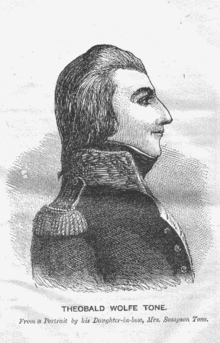
In 1169, Norman warriors landed on Ireland to conquer the islands, just like they had done with England. By the 1530s, Henry VIII consolidated the conquest in Ireland. Despite the oppression of a foreign imposed government at Dublin Castle (image) and religious laws prohibiting office holding by Catholics, the Irish at least had their parliament in Dublin to make decisions for the island, even if the parliament was Anglican controlled. The French Revolution increased Irish awareness of English oppression, but the large number of Irish Catholics under arms in militia units offered bargaining opportunities. With the help of the Society of United Irishmen, Catholic emancipation and democratic reforms found a wide audience. One of Ireland’s new leaders, Theobald Wolfe Tone enlisted French support for the cause, but the 1796 invasion failed without landing any troops. Inspired, the Irish rose up in insurrection in 1798. The British authorities quickly suppressed the uprising and prosecuted the rebels. On November 19, 1798, the British executed Wolfe Tone. Furthermore, Parliament passed the Act of Union of 1800/01, which abolished the Irish parliament.
“From my earliest youth I have regarded the connection between Great Britain and Ireland as the curse of the Irish nation, and felt convinced that, while it lasted, this country could never be free nor happy.” – Theobald Wolfe Tone, On Being Found Guilty (1798)
Image: Sullivan, Timothy D. Speeches from the Dock. New York: P. J. Kenedy, 1904. Page 12.